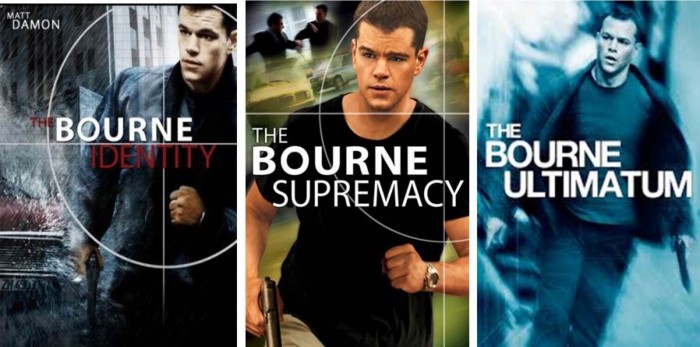'Jason Bourne' Was So Bad, It Made Me Retroactively Reconsider My Love Of The Franchise
I'm a die-hard Bourne film fan. I've watched Matt Damon's Bourne films more than 15 times collectively. I've listened to John Powell's scores for each more than 100 times. I was disappointed when the Damon / Paul Greengrass combo didn't return for Legacy, but I always held out hope that if they did ever come back, it would be because they had a compelling adventure in store for us.
This weekend, nine years after the release of The Bourne Ultimatum, Jason Bourne hits theaters and it is, by far, the weakest of Damon's Bourne films. Not only does it bring nothing new to the table for the franchise, but the film just feels like a shambling corpse of its former self. Continue after the jump to read my Jason Bourne review.
David Chen's Jason Bourne Review
[Note: This article will reveal some plot details from Jason Bourne.]
In interviews, Greengrass and Damon talk about the topical motivations for bringing back the iconic character, including the changing norms around privacy in a post-Snowden world. But the plot here is so thin and so similar to the other films that I was stunned they considered it worthy of bringing Bourne out of hibernation.
In Jason Bourne, Bourne realizes he has even more memories about his past that he needs to uncover. And while the CIA is trying to take him out and/or stop him from unraveling his past, it's also tangling with a major figure (in this case, it's Aaron Kalloor, played by Riz Ahmed, CEO of a fictional Silicon Valley company) trying to uncover one of its sketchy programs. Sound familiar?
Okay, so the Bourne films have never been super innovative with their plotting. But what they all had was a propulsive energy and a vicarious joy that came from watching Bourne stay one step ahead of the CIA's "assets."
By comparison, Jason Bourne feels languorous and listless. Bourne is not the author of his destiny — he's just reacting, sometimes in stupid ways, to the things going on around him. There's a scene in the new film where Bourne breaks into a hacker's house, then leisurely downloads and examines some files on a laptop while next to a window with the blinds up. Not exactly discreet behavior for someone who is supposed to be a genius at staying off the grid (turns out the CIA is actually watching him the whole time and coming to get him, btw). These out-of-character moments culminate in the final action scene, where Bourne makes a critical decision that feels like it ignores any ethical/moral lessons he might have absorbed from any of the previous films.
Beyond betraying what we know about the character, Jason Bourne feels like what would happen if someone wrote an outline for a Bourne script but never bothered filling in the details. Characters often just state themes out loud, like "Remembering everything doesn't mean you know everything," and "Privacy is freedom!" A scene where Aaron Kalloor introduces his company's new online platform reads as an unintentional parody of an Apple event, rather than an incisive critique of one. ("No one will be watching you!" Kalloor claims, trying to quell surveillance concerns, before being greeted with thunderous applause. Thanks, Aaron! Guess that answers all our questions.)
At one point, Bourne takes out a thumb drive with classified CIA files that has the word "ENCRYPTED" written on it. Like, actually written on the thumb drive itself, with some kind of white-out or something.
The scenes of computer hacking in this film have not evolved whatsoever since the early aughts, which is just not acceptable in a post-Mr. Robot world. Computer screens flare to life with all kinds of fake-looking UI wizardry that lay out top secret CIA assassin programs in easily recognizable folders. A dossier of Nicky Parsons declares, in big letters at the bottom, "LINKED TO JASON BOURNE," just to make sure the audience does not miss this crucial detail. It all feels like Bourne for Dummies, rather than the latest entry in one of our smarter spy movie franchises.
Jason Bourne does deliver when it comes to action. Kind of. A set piece in an apocalyptic Greece early on in the film is impressively staged, while a Las Vegas car chase scene has enough visceral thrills to make you forget that the reason for the chase is due to an incredibly silly, cringeworthy third act twist.
But the film adds nothing new to the idea of Jason Bourne. We've seen him run. We've seen him slowly remember crazy details about his past. We've seen him run from the CIA until he kills everyone who's after him (or they kill each other). Everything about this film feels like it's just half-heartedly trying to capture the glory of its younger days. The character archetypes are the same, with Tommy Lee Jones subbing in as Brian Cox's experienced-but-probably-somewhat-evil CIA agent and Alicia Vikander taking on Joan Allen's green-but-trying-to-prove-herself character. Even John Powell's score feels like a limp retread of his superlative work from the previous films. The filmmakers responsible for this movie should have done what the CIA should've done a long time ago: Leave Jason Bourne alone.
At least the new Extreme Ways by Moby was good.
/Film rating: 5 out of 10


